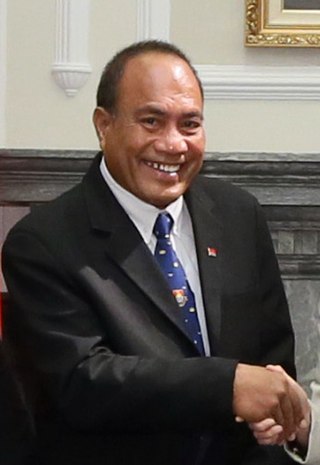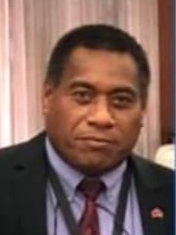
Politics of Kiribati takes place in a framework of a parliamentary representative democratic republic, whereby the Beretitenti, President of Kiribati, is both the head of state and head of government, and of a multi-party system. Executive power is exercised by the government, Beretitenti, and his cabinet, all MPs. Legislative power is exercised by the House of Assembly. The Judiciary of Kiribati is independent of the executive and the legislature. The Constitution of Kiribati, promulgated at independence on 12 July 1979, establishes the Republic of Kiribati as a sovereign democratic republic and guarantees the fundamental rights of its citizens and residents.

A member of parliament (MP) is the representative in parliament of the people who live in their electoral district. In many countries with bicameral parliaments, this term refers only to members of the lower house since upper house members often have a different title. The terms congressman/congresswoman or deputy are equivalent terms used in other jurisdictions. The term parliamentarian is also sometimes used for members of parliament, but this may also be used to refer to unelected government officials with specific roles in a parliament and other expert advisers on parliamentary procedure such as the Senate parliamentarian in the United States. The term is also used to the characteristic of performing the duties of a member of a legislature, for example: "The two party leaders often disagreed on issues, but both were excellent parliamentarians and cooperated to get many good things done."

Anote Tong is an I-Kiribati politician for the Pillars of Truth party and environmental activist with half Chinese heritage, who served as the fourth president of Kiribati, from 2003 to 2016. He won the election in July 2003 with a slim plurality of votes cast (47.4%) against his older brother, Harry Tong (43.5%) and the private lawyer Banuera Berina (9.1%). The elections were contested by the opposition, due to allegations of electoral fraud but the High Court of Tarawa had confirmed that there was no fraud. He was re-elected on 17 October 2007 for a second term (64%). In 2012, Tong was reelected for a third term, although with a significantly smaller percentage than in the previous two elections.

Protect the Maneaba, initially known as the Christian Democratic Party, was a political party in Kiribati.

The president of Kiribati is the head of state and head of government of Kiribati.

The House of Assembly is the Legislature of Kiribati. Since 2016, it has 45 members, 44 elected for a four-year term in 23 single-seat and multi-seat constituencies and 1 non-elected delegate from the Banaban community on Rabi Island in Fiji. From 1979 to 2016, the Attorney general was an ex officio member of the legislature, until a change of the constitution modified this provision.

The vice-president of Kiribati is the deputy head of State of the Republic of Kiribati. His or her constitutional functions are to exercise the duties of the President of Kiribati, temporarily or permanently, should the latter be unable to do so, and to "be responsible for such business of the government as the Beretitenti [President] may assign to him".

The 9th Parliament of Kiribati is the current term of the House of Assembly of Kiribati. It was determined by the 2007 parliamentary election.

The House of Assembly of Kiribati has a Speaker, a function adapted from the British Westminster model. The position was established in 1979 by article 71 of the Constitution, when the country became independent from the United Kingdom. It replaced the Speaker of the former House of Representatives existing since 1967, then known as Legislative Council in 1970 and House of Assembly since 1974.

Parliamentary elections were held in Kiribati on 21 and 28 October 2011. In the first round, exactly half of the 44 members of parliament were elected, with the remainder chosen in the proceeding run-off elections. 30 candidates were reelected, and four government ministers lost their seats. One seat had to go to a third round of elections due to two candidates tying in the second round. In the third round, Jacob Teem defended his seat against Rutio Bangao with just 27 votes difference.

Taomati T. Iuta was an I-Kiribati politician. He was Speaker of the House of Assembly of Kiribati for the Ninth Parliament (2011–2015). He was the vice president of Kiribati from 1991 to 1994.

The Judiciary of Kiribati is the branch of the Government of Kiribati which interprets and applies the laws of the country. In addition to the Constitution of Kiribati and the corpus of laws, the laws of Kiribati include customary law, which the courts must take into account when considering specified matters in criminal and civil proceedings.

Taneti Maamau is an I-Kiribati politician who has served as the sixth president of Kiribati since 11 March 2016.

Tessie Eria Lambourne is an I-Kiribati civil servant, diplomat and politician. She has been a member of the Maneaba ni Maungatabu (Parliament) since April 2020. She was formerly Kiribati's Ambassador to the Republic of China (Taiwan) from June 2018 to September 2019 and Secretary to the Cabinet, the highest position in Kiribati's civil service, from August 2016 until June 2018.
Maere Tekanene is a former I-Kiribati politician, and part of the Pillars of Truth party, who was the Kiribati Member of Parliament for the South Tarawa constituency from 2011, and the Education Minister from 2012, until losing her seat at the 2015–16 parliamentary election.

Parliamentary elections were held in Kiribati in 2020 to elect members of the House of Assembly. The elections were originally planned on 7 April 2020, with a second round of voting to be held on 15 April 2020. However, in late March the Electoral Commission changed the voting date to 14 April 2020, with a second round on 21 April 2020.
Vincent Tong is a Kiribati politician and the elder son of Anote Tong, the President of Kiribati from 2003 to 2016.

Tekeeua Tarati is an I-Kiribati politician and entrepreneur, Minister for Information, Communications, Transport and Tourism development since July 2020.
Taabeta Teakai is the Minister of Employment and Human Resources in Kiribati. She was the only female member of the government appointed in 2020.









